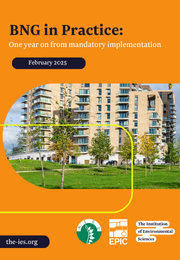Mandatory BNG is a world-leading piece of legislation that aims to ensure development delivers for nature. It came into force for major developments in England on 12 February 2024.
Drawing on insights from over 200 practitioners gathered through survey, workshop and interview data, BNG in Practice provides a comprehensive analysis of the challenges faced in the implementation of mandatory BNG one year after its introduction. The report is the culmination of a six-month research project from members of the IES Environmental Policy Implementation Community (EPIC), Environmental Impact Assessment (EIA) Community and the Association of Local Government Ecologists (ALGE).
The report makes over 20 recommendations to government, delivery organisations, and supporting bodies, including:
- Take a systems approach. Links with wider environmental policies, such as ELMs and LNRS, need to be strengthened and clarified to ensure that BNG supports high-quality and sustainable habitat delivery in the right places.
- Close loopholes in exemptions. The potential for exemptions to BNG to be applied incorrectly is causing unnecessary tension and bureaucracy for planners and developers. The custom and self build exemptions should be removed.
- Modern data standards. From the beginning to the end of the BNG process, what information is collected and how it is collected, should be standardised across the country, and made easily accessible in a centralised, digital format.
- Support for small developers. The current BNG requirements for small sites are placing a disproportionate burden on small developers, slowing down development and increasing costs. A levy should be introduced for small sites.
- Invest in LPAs. Significant funding in LPA legal and ecological capacity is required to address the delays to securing BNG legal agreements that are seizing up the planning system
- 21st century habitat monitoring. Under the current system, monitoring of BNG is at risk of not taking place in practice, especially for on-site gains. New and innovative ways of monitoring habitats, including remote sensing and citizen science, should be fully explored and enabled.
- A BNG regulator is essential. A dedicated BNG regulator is needed to set positive standards, regulate the private biodiversity market, and take action against landowners who do not deliver promised gains.
The report warns that without decisive intervention, biodiversity gains - such as woodland, meadows, and urban green spaces - may fail to materialise, and that action must be taken to unleash a modern, collaborative and data-driven planning system that delivers high-quality development together with meaningful nature recovery.
A webinar is being held with on the 27th February to present and discuss the report's findings, and launch the second phase of the BNG in Practice project.
To get in touch about the report, please email IES Policy Officer Ellie Savage (ellie@the-ies.org).


